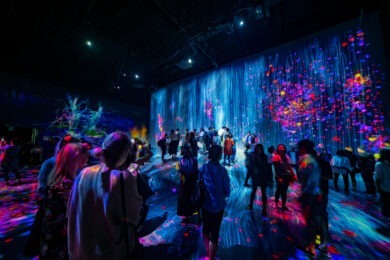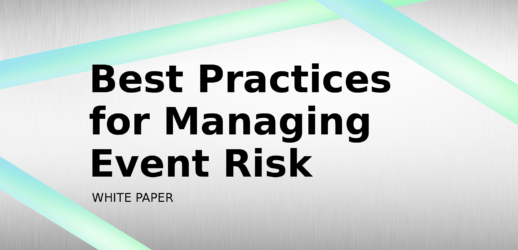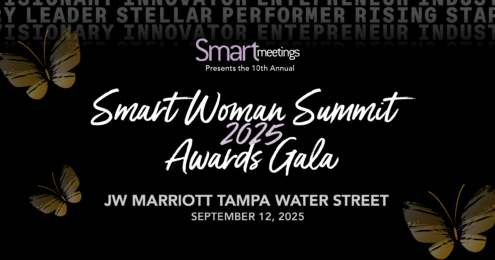Thriving Leo Events offers festivalization and other exciting, immersive options
When challenged to create a storybook that would help Walmart CEO Doug McMillon illuminate the company’s history in a “magical way” at its Shareholders Meeting in 2017, Leo Events got busy.
“We created an actual pop-up book where all of the pages were white, and we projection-mapped onto them, so as he turned the pages, the story unfolded in full animation, pictures and video,” says Kent Underwood, one of the three co-founders and principals of Leo Events, an innovative company based in Memphis, Tennessee. “It was a huge hit and the book resides in the Walmart museum.”
Walmart tapped Leo Events the following year to again help with its Shareholders Meeting. “We had to top ourselves in 2018, so we worked to develop a hologram of Sam Walton [the company’s founder, who died in 1992], who ‘came back’ to address the live and broadcast audience,” Underwood says. “The development and execution of that—in just weeks, no less—is a long story unto itself. But the result made national news and was given a thumbs-up by all of the Walton family members—our toughest audience.”
Kevin Brewer—who, along with wife Cindy are the other co-founders and principals of Leo Events—fondly recalls the audience’s reaction.
“There was so much emotion that filled the audience, especially for the Walton family, who had no idea it was coming,” Kevin said.
The company has created many other magical, immersive moments—such as bringing a life-size Pac-Man for a group to play at its event—since the trio was founded in Memphis in 2002. Originally known as Destination King, Inc. the name was changed to Leo Events in 2012.
“Leo aims to not only deliver spectacular events, but also to move and motivate the audience,” Cindy says. “Kevin, Kent and I have sought to bring something to the industry that we felt was missing.”
They each lead one of the company’s three divisions. Cindy concepts all marketing, business development and administrative efforts, as well as internal meetings and philanthropic initiatives; Kevin oversees the meeting and event management division; and Kent is head of the public events and festivals division. The company also has its own transportation unit.
Leo began with 11 employees and now has 51 full-time workers. It has offices in Nashville and Chattanooga, Tennessee, and has moved its corporate office to the up-and-coming Edge District of downtown Memphis. Over the years, Leo has helped put on more than 190 events in 23 countries, along with the Cayman Islands.
“Every event we execute is important to us—no matter the size and type,” Cindy says. “It’s important to us to showcase the diverse range of clients we have the opportunity to work with, as it lets the world see all of the different types of capabilities we offer. We are so unique in our offerings and our niches that the more we showcase, the more it might spark a client that has potential for us. We never want to seem too big or too small of a company to design, execute and deliver.”
Leo has a wide network of partners that includes planners and vendors.
“We don’t always work with planners: It depends on the type of event we’re producing,” Kent says. “For instance, planners in the traditional sense don’t fit into the planning for a public festival.”
The Festivalization of Meetings and Events
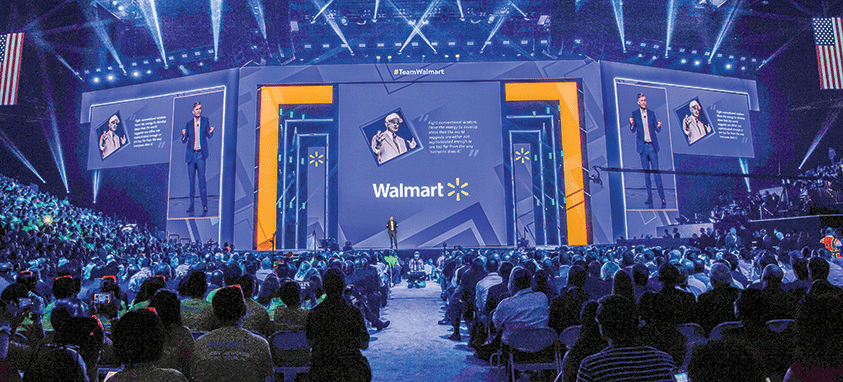
Festivalization, which refers to designing traditional business events to include the best parts of a consumer festival to better address attendees’ needs, is a key component of Leo’s offerings, however, and is included in events such as Walmart’s Shareholders gathering.
“Walmart Shareholders is a great example of festivalization in the corporate sector,” Kent says. “This annual meeting that takes place every June incorporates Grammy-style performances in between general sessions. Acts like Katy Perry and Jason Derulo have kept attendees on their feet and excited to get to the next critical message delivery, and then on to another performer. In this case, the acts are always kept secret so that each time a new performer is announced, it’s a surprise to the audience.”
Cindy says that among the 20 top event agencies in experiential marketing and live experiences, only Leo Events has a public events and festivals division.
“Audiences are looking for interactivity, as attention spans have shortened,” Cindy says. “The festival model accomplishes this. You can have a traditional main stage for entertainment, but the use of multiple stages or performance areas allows audiences to stay engaged and active. The event can stay inside, or move outside or to a nontraditional venue.”
Kent lauds the flexibility of festivalization.
“The great thing about the festival approach to events is that it works for talent budgets of any size,” he says. “The beauty of festivals is that there is music throughout the day by various artists, and it can include solo artists, performance artists, interstitial talent, comedians and bands. Comedy has worked very well for us in festivals and at corporate events.”
Leo Events also incorporates radio frequency identification (RFID) and Bluetooth technologies—often used in festivals—in corporate meetings.
“With more robust apps than normally seen at corporate events, we track attendance, analyze what add-ons attendees gravitate to and even see which sessions and talent nab the biggest following,” Kevin says.
“Incorporating this type of technology allows clients to maneuver large-scale logistical issues in and out of venues’ food and beverage traffic—pushing people to less busy bars and buffets—and manage tracking for procurement reasons,” Cindy adds. “For example, a recent client of ours who has a large meeting in Las Vegas found that their delegates were not attending sessions as frequently as the client would like. Through this technology, we worked alongside the company to implement a system for reimbursement that directly correlated with the amount of client-sanctioned events attended.”
A Blending of Talents
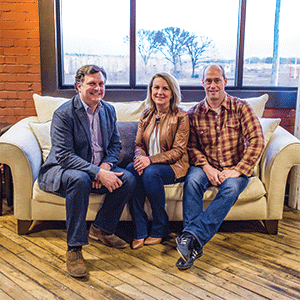
Leo draws on the backgrounds of its three principals to accomplish its mission. Cindy, a native of Memphis, majored in general communications at University of Tennessee-Knoxville and later worked in tourism sales at Nashville Zoo, Legends Club of Tennessee (a golf resort), a Hard Rock Cafe and Beale Street.
“I found joy in selling destinations, so tourism sales turned into event sales and Destination King,” she says. “The rest is history.”
Kevin, who hails from Charlotte, North Carolina, developed an interest in the tourism industry as a child. “My mom worked for Eastern Airlines, so I had the opportunity to travel and experience other cultures. I always knew I wanted to be involved with tourism,” he says, adding that sales has always felt like a natural fit.
He majored in parks, recreation and tourism management at Clemson University in South Carolina and went on to serve as director of worldwide sales for Hard Rock Cafe, director of sales and marketing at Dover Motorsports, Inc. and vice president of sales for Memphis Convention and Visitors Bureau.
Kent, a central Kentucky native, majored in broadcast communications at Asbury College (now Asbury University) in Wilmore, Kentucky, and began his professional career in sales and marketing, creating business opportunities for group travel, which ultimately led him to event management for corporate and convention planners.
His interest in events dates to his high school days, when he and his brother created a company that promoted concerts. He later founded a ticketing company, managed a 2,000-seat venue, went on the road with bands, worked at an experiential marketing agency, ran an exhibition group and oversaw many music festivals before becoming partner and chief invention officer at KaabooWorks, which creates immersive festivals and events.
“It’s all added to the knowledge base that has allowed me such a varied viewpoint when it comes to looking at every angle of an event,” Kent says.
Kevin and Cindy actually started Destination King when Kent was working independently, though the two men had collaborated on several projects.
“It became clear over the years that our companies were well-aligned,” Kent says. “But we were complementary in the types of services we offered our event clients, rather than competitive. So, it was an obvious next step to talk about merging together and the even larger level of offerings that would result from that—it was a natural progression.”
A Total Team Effort
Leo Events’ team concept goes well beyond the collaborative efforts of its founders, though.
“We have worked to create a collaborative environment where our team is free to brainstorm all of their wildest ideas,” Cindy says. “We spend a lot of time together, and the family mentality we embrace makes it easy and fun to want to bounce ideas off each other.
“We frequently have creative lunches to bring the whole team together, because you never know what ideas you can come up with when you put all heads together. And because we want our employees to never stop learning and growing, we support their attendance at industry shows and conferences. Our employees then come back and present any cool ideas they learned over The Huddle, our weekly conference call that brings together all three of our offices together—via WebEx, that is.”
The team has developed several substantial partnerships with clients. For example, it handles every aspect of Kowa Pharmaceuticals’ annual national sales meeting in Memphis, including sourcing and fund management, meeting services, creative strategy, engaging technology and full production.
“By immersing ourselves in Kowa’s culture, we were able to successfully create a comprehensive meeting that accurately tells our client’s story,” Cindy says. “The immersion is what ultimately led to a trusting partnership that feels more like a family—a connection that has allowed us to grow alongside Kowa’s brand. The exceptional ROI results for this meeting speak for themselves. Higher employee engagement has resulted in increased sales, as well as a new product.”
The company’s team efforts have been evident in successful events such as BlueCross BlueShield Riverbend Run in Chattanooga. The event needed to be revitalized, so Leo created more buzz around it by arranging for a local TV anchor to provide live coverage throughout the race. Brand ambassadors passed out fun giveaways for the racers and race attendees, and a post-race concert was added.
During its 17-year history, Leo has also had its share of comical moments. At an outdoor barbecue event, Leo clean-up staff members found themselves hauling pig carcasses out of a parking lot because the trash had already been collected. At another event, a floral vendor delivered silk orchids rather than actual orchids (which were requested) to be used as centerpieces.
Philanthropic Efforts
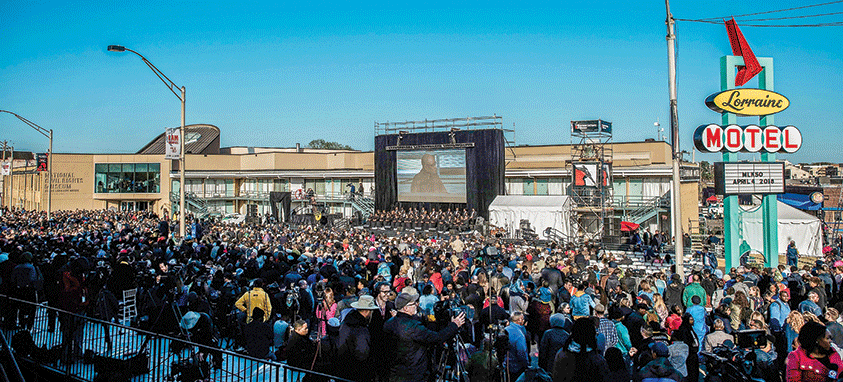
Some of the company’s events have helped to actualize its efforts to create a better world. MLK50—which commemorated the 50th anniversary of Dr. Martin Luther King Jr.’s assassination in Memphis—blended the efforts of National Civil Rights Museum and Leo Events. Some 30,000 people attended the main event, which included daylong tributes featuring music, dance and spoken reflections from civil rights activists, along with a private after-event for more than 1,000 people. Coverage of the tribute went viral, with a total media reach of more than 5 billion people. Leo handled all event, housing travel and logistics management for the April 4 Day of Remembrance and the Evening of Storytelling.
Leo Events also has volunteered time, donated in-kind and supported, in a variety of ways, local businesses, organizations, charities and initiatives, including National Civil Rights Museum, Habitat for Humanity, Room in the Inn (an ecumenical ministry that serves the homeless), Jay Uiberall Foundation (which improves the lives of Memphians—primarily youth—by supporting programs that improve critical thinking skills), Le Bonheur Children’s Hospital and St. Jude Children’s Research Hospital.
“One of my favorite give-back initiatives is our corporate challenge team, which supports St. Jude,” Cindy says. “This allows us to have an innovative, team approach to philanthropy that includes pre- and post-race fun. At the end of the day, St. Jude is going above and beyond for the kids—and for the city of Memphis—and the St. Jude Memphis Marathon allows us to play a small part in the efforts to end childhood cancer.
“Giving back is a huge part of our culture at Leo, and there are many reasons why. Not only does it help Leo to build a strong reputation within our communities: It also boosts employee morale. Our team is proud of the work they do and want to be involved—and that makes me so proud to witness.”
Looking Toward the Future
Kevin said that moving forward, Leo Events must avoid being complacent.
“It’s important to us to stay in the forefront of our offerings and keep learning and growing every day,” he says.
“I see Leo expanding the depth of our offerings,” Kent adds. “I believe we’re at the top of the game when it comes to both large-scale production for corporate engagements and public events. We work in a regional manner on B2C consumer engagements for some companies, and I think we are going to expand that footprint.
“Likewise, we’ve really grown our technical and digital offerings in-house and we’re going to launch a slate of those offerings out to all of our industry verticals in a big way over the coming years.”
Kent’s full work schedule, wife Ongeleigh and two young children leave little time for his other passions—hiking and biking. “Luckily, chasing the kids around is exercise enough!” he says.
Cindy and Kevin also love outdoor activities—she enjoys skiing and running half-marathons and he likes golfing and biking—and have managed to work them into their schedule while raising two boys.
“Work-life balance is important, and that’s something I’ve been working to instill in the minds of Leo employees,” Cindy says. “Life is too short not to make time to do the things we enjoy. Trust me, there are times I’ve not been able to do something personal or for family because of work, but we try to balance that with creating great memories with the ones we love when we can.”
Kevin also emphasizes balance: “You’re not going to be successful in your personal or professional life if you don’t take the time to do the things you enjoy. Luckily, my job is my passion, so it never feels like I’m working.”
They enjoy spectator sports, but who do their boys root for when Kevin’s Clemson Tigers compete against Cindy’s University of Tennessee Knoxville Volunteers?
“Clemson—I’ve taught them well,” Kevin says.
“Clemson, all the way,” Cindy agrees. “They are their father’s sons! Unless they are with their grandparents, and then it’s ‘Go, Vols’ or go home.”
Tips to Improve Festivalization at Events
Competition continues to heat up among brands and organizations for consumer attention and engagement. Some 32 million people attend a music festival in the United States each year, so it’s no surprise that companies are incorporating festivalization to engage audiences at corporate events.
Leo Events produces four ticketed music and arts festivals with more than 250,000 attendees annually, enabling it to develop best practices in festival design, including accompanying technology and social media initiatives. These tips from Leo Events can guide planners and organizers to put on a successful event.
Designing the Event
Many clients are seeking a change from a traditional concert in the ballroom on the last night of a conference. They are also looking for interactivity, as attendees’ attention spans have shortened. The festival model accomplishes this—there is a traditional main stage for entertainment, but multiple stages or performance areas are used, enabling audiences to stay engaged and active. The event can be held inside, outside or at a nontraditional venue.
A festival-type event consists of more than just multiple acts performing, though. Leo has been bringing art installations and live artists into the space, for example. Multiple approaches to food, from tasting stations to food trucks, also augment the overall event.
Comedy is another method that has worked very well for Leo at festivals and corporate events. Some great comedians are very budget-friendly.
Tech Tools
It’s the tech age, and with that comes a constant need for information. Give it to your guests with a custom event app—it’s how Leo interacts with festival participants. Attendees can build their own schedule, access site maps and explore festival offerings, all from their mobile devices. The event app goes a long way in enhancing often overlooked, but core elements of any event. For instance, vegans can search for on-site vendors that meet their dietary needs and participants needing guest services are notified how to find them.
Another tech element is the RFID wristband. Once attendees enter a festival, they move their wrists over readers to gain entry. Throughout the festival, the wristbands can be used by VIPs to gain admittance to special access points.
Social Media
The meetings and events industry quickly adapted and applied social media to programs when it first emerged. It used to be sufficient just to have a social media presence, but that’s no longer the case. It’s necessary to interact with guests through their preferred channels.
A fun and customizable activation that’s great for any audience is a Twitter or an Instagram vending machine. With a custom machine wrap and themed vending items—such as branded earbuds, sunglasses, cocktail shakers and gift cards—attendees can come up and “Tweet for a Treat.”


